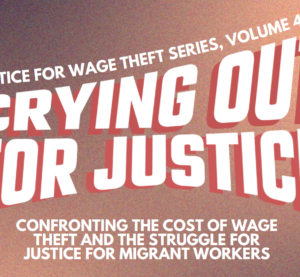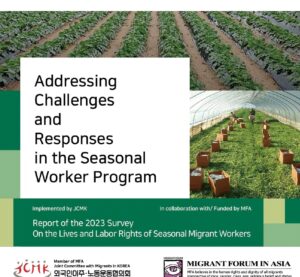Global Call to Action: Global Campaign for Decent Work and Rights for Domestic Workers
— November 20, 2010Between International Human Rights Day (December 10, 2010) and the opening of the International Labour Conference (June 1, 2011), take action to demand an ILO Convention on domestic work.
Organized domestic workers have been struggling for decades to be recognized and respected as workers, demanding the same rights and access to social protection as any other workers. This year we have the opportunity to win an enormous victory if the ILO adopts a Convention for Decent Work for Domestic Workers at the 100th International Labour Conference in June 2011 and we need your support and solidarity!
What is an ILO Convention and why is it important?
The International Labor Organization (ILO) is part of the United Nations. An ILO Convention creates international law setting forth standards that guarantee labour rights. This Convention would recognise domestic workers as workers with the same rights as other workers. It will pave the way for the reduction of slavery-like conditions, abuse, violation, inequality and discrimination that domestic workers face. It will help reduce the worst forms of child labor, the stigmatization and criminalization, and violation of rights of migrant domestic workers, and racial and ethnic discrimination.
The campaign for the Decent Work for Domestic Workers ILO Convention has broader impacts beyond the obvious importance of labor standards for domestic workers. The collaboration between the trade unions and domestic worker organizations is a model for how the trade union movement and independent worker organizations can work together with common vision and build a dynamic labor movement. If the ILO adopts this Convention, it could represent a renewed commitment of the ILO to set standards and a new willingness to address the real needs of the majority of workers in the world who work in informal sectors. And the process of ratification and implementation will necessitate innovations in enforcement and collective bargaining that can help us all realize workers human right to decent work and to organize.
The domestic worker movement that has called for this ILO Convention is vibrant, and together with you we hope we can build more powerful labor, migrants’ rights, and women’s movements.
Who we are: The Steering Committee for the Global Campaign for Decent Work and Rights for Domestic Workers is a global alliance of domestic workers’ organizations, unions, and advocates united around a global campaign to win an ILO Convention to ensure decent work and rights for domestic workers in 2011.
Call to Action:
We invite everyone to join us in a global campaign for decent work and rights for domestic workers by organizing actions to put pressure on governments to vote for a meaningful and strong rights-based international Convention and to use this moment to raise public awareness for rights and respect for domestic workers. Now is the time to dispel the notion that domestic workers are workers of servitude and instead affirm domestic workers as indispensable workers entitled to fair work, fair wages, 8-hour standard working time, and fair treatment in accordance with the ILO Decent Work Agenda.
From International Human Rights Day (December 10, 2010) through the opening of the International Labour Conference on June 1, 2011, we will mobilize. From South Africa to Belgium, from Washington DC to Asia, we ask you to join us in calling on all governments to support this historic Convention. Over this period you can organize actions anytime, but there are some particular dates when we can focus our actions:
- 10 December International Human Rights Day
- 18 December International Migrants’ Day
- 8 March International Women’s Day
- 1 May International Workers’ Day
There are also specific Domestic Workers’ Days in various countries such as 9 January in India, 15 February in Indonesia, 30 March in the Americas, and last Sunday of April in the Philippines and 10 December in Thailand.
Please be in touch with us for more information and to tell us about what you are planning so that we can coordinate and amplify the voices of the women, workers, migrants, and everyone taking action.
- Asian Migrant Domestic Workers’ Alliance (ADWA): adwasecretariat@gmail.com
- International Domestic Workers’ Network Asia (IDWN-Asia): fiship.ctu@gmail.com
- International Domestic Workers’ Network: karin.pape@iuf.org, www.domesticworkerrights.org
- Migrant Forum in Asia (MFA): mfa@pacific.net.hk, tel/fax: (+632) 433-3508, www.mfasia.org
- RESPECT Network (Europe): fejusay@yahoo.com, www.respectnetworkeu.org mobile: (0031)-6-3420.4226
- National Domestic Workers’ Alliance USA (NDWA): jill@domesticworkers.org, www.domesticworkers.org
Domestic Workers call for a Convention that includes:
- The same fundamental rights as other workers, as enshrined in the ILO Declaration on the Fundamental Principles and Rights at Work (1998),
- Minimum working age regulations for domestic workers
- A legally binding employment contract
- A living wage and existing minimum wage regulations applied also to domestic workers
- At least one day off in every seven-day period
- Regulation of working hours – respecting an 8 hour day – and of payment for overtime and stand-by time
- Regulation against abuse and harassment
- Occupational health and safety standards applied to private homes where domestic workers are employed
- Access to social security and insurance protection
- Right to reproductive, family and health services and maternity leave
- Access to paths to legalization and regularisation for migrant domestic workers, and immigration status independent of their employers
- Freedom for workers to choose whether they live-in or not, and if so, decent conditions and freedom to come and go and respect for privacy.
- Right to keep one’s own documentation (ID cards, passports, work permits, etc.)
- Enforcement measures such as labour inspection and dispute settlement procedures (right to redress)
- Sustainable and elective return and reintegration policies and programs for migrant domestic workers



